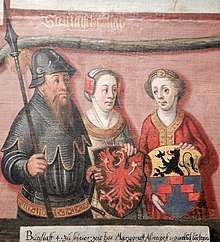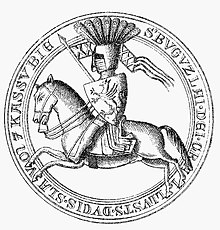Bogislaw IV (Pomerania)



Bogislaw IV. (* Before 1278 † February 24, 1309 ) was Duke of Pomerania and the son of Barnim I.
Life
After the death of his father in 1278 when his younger half-brothers Barnim II († 1295) and Otto I were minors, Bogislaw led the government alone and was named provisor fratrum in the deed of division in 1295 . During this time, the Brandenburg feud of 1278–1284, which was important for the formation of north-eastern Germany and in which Bogislaw was also significantly involved, fell. Because although the Duke was related by marriage to Mechtild, a daughter of Margrave Johann , with the Ascanians , he sought more and more through an alliance of June 13, 1283 with Saxony , Mecklenburg , the Principality of Rügen and the Hanseatic cities to withdraw the growing power of the Electorate of Brandenburg, supported by Denmark , but had to make the unfavorable peace at Vierraden on August 13, 1284 . The complete settlement of the great feud came on the one hand from the newly founded royal power, which after its fortification in southern Germany also began to draw the northern part into the realm of national politics, on the other hand from the north German princes, estates and cities themselves. While after the defeat of Ottokar II of Bohemia the Roman-German King Rudolf von Habsburg granted the southern German states the blessings of peace, northern Germany united on May 15, 1287 to the Rostock Land Peace . This treaty was important for the development of the Hanseatic League and the cities on the Baltic and North Sea, whose power grew stronger every year. The spread of Luebian law in the Baltic Sea area brought about an approximation of social and state conditions and united the cities to form a solidarity-based whole, the core of which was based on that of Bogislaw and Witzlaw II of Rügen by expanding their privileges in the municipalities of the Wenden area. Under Adolf von Nassau , however, the peace was broken and as a result, in 1295 the Margraves of Brandenburg at Mühlhausen renewed the right to fiefdom over Pomerania granted by Emperor Friedrich II . This was followed by repeated Handel in Mecklenburg and the succession dispute in Pomerellen ; on the other hand, the dispute that broke out between the surviving brothers Bogislaw and Otto after Barnim's death in 1295 was settled on July 12, 1295 in Szczecin in such a way that Bogislaw received the Pommern-Wolgast region and Otto I. Pommern-Stettin as his inheritance As a result, the two duchies remained separate for 169 years.
Strengthened in the internal circumstances of his country, Bogislaw tried when after Przemysl's death in 1296 Władysław I. Ellenlang assumed rule in the Kingdom of Poland and the Duchy of Pomerellen, based on his right to inherit in the latter area, to take possession of part of Western Pomerania; but at the same time Brandenburg raised claims to which Bogislaw sought to meet in alliance with Władysław I and Bishop Petrus von Cammin in the Margrave War . When the Camminer bishop Petrus died and his successor, Bishop Heinrich , left the sovereign's party and after Wladislaw I was deposed from the throne, King Wenzel of Bohemia, who was a friend of Brandenburg, claimed suzerainty over Pomerania, Bogislaw had to renounce his plans. Presumably also because a superior opponent arose for him in the Brandenburg Margrave Waldemar . Even the repeated elevation of Vladislav I. Ellenlang to the Polish throne after Wenceslas's death had no favorable consequences for him: he had to give up the land occupied beyond the Persante and Golm , and finally the aging duke saw himself forced to a peace, in which also the renegade Bishop Heinrich von Cammin was included. In this he achieved an extension of the state border through the Belgard area, but had to recognize the feudal rule of Brandenburg for himself and his successors. Soon afterwards Bogislaw died after a thirty year reign on Matthias Day (February 24th) 1309 and found his grave in the restored cathedral church at Cammin . From his second marriage to Margarethe, a daughter of Prince Wizlaw II of Rügen, comes Wartislaw IV , who followed him in the government of Pomerania-Wolgast.
See also
literature
- Adolf Häckermann : Bogislav III . In: Allgemeine Deutsche Biographie (ADB). Volume 3, Duncker & Humblot, Leipzig 1876, p. 42 f.
- Roderich Schmidt : Bogislaw IV. In: New German Biography (NDB). Volume 2, Duncker & Humblot, Berlin 1955, ISBN 3-428-00183-4 , p. 416 ( digitized version ).
- Roderich Schmidt : Bogislaw IV . In: Lexicon of the Middle Ages (LexMA). Volume 2, Artemis & Winkler, Munich / Zurich 1983, ISBN 3-7608-8902-6 , Sp. 324.
proof
- ↑ Scriptores rerum Prussicarum , Volume I, loc. cit, pp. 708-709, note 91
- ↑ Martin Wehrmann : History of Pomerania . First volume, Waidlich Reprints, Frankfurt 1981 (unchanged reprint of the first edition from 1904/06), p. 99.
Web links
| personal data | |
|---|---|
| SURNAME | Bogislaw IV. |
| BRIEF DESCRIPTION | Duke of Pomerania |
| DATE OF BIRTH | 13th Century |
| DATE OF DEATH | February 24, 1309 |